The post Joseph and His Dreams (Genesis 37) appeared first on Discover Bible Verse.
]]>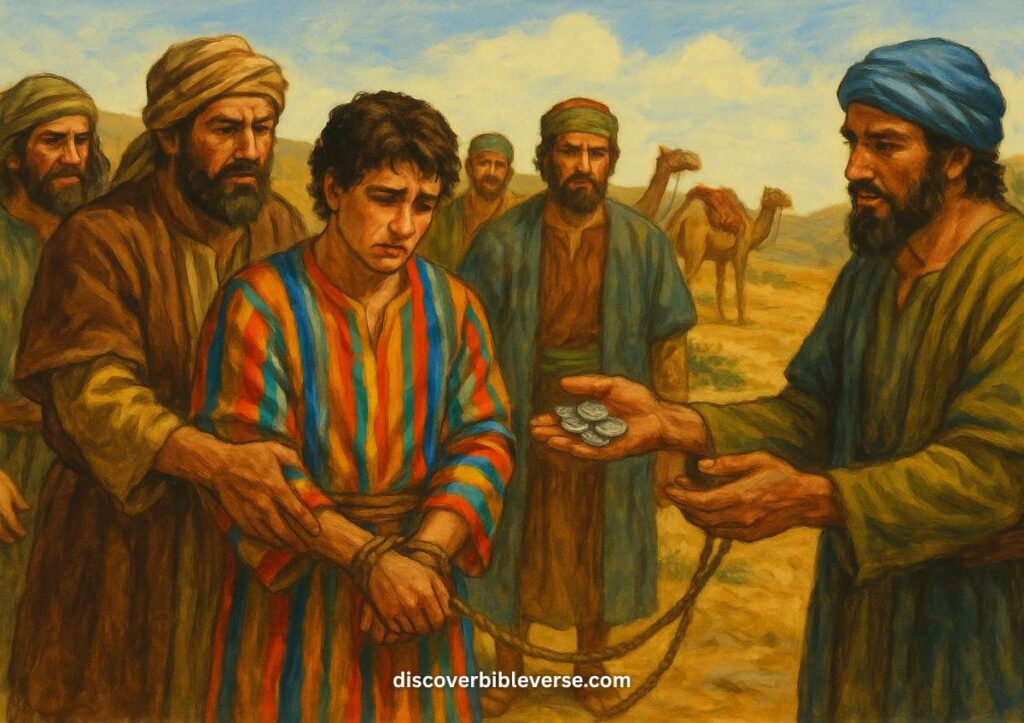
Joseph was the beloved son of Jacob and Rachel, born in Jacob’s old age. He was the eleventh of twelve brothers, yet Jacob loved him more than the rest. As a symbol of this affection, Jacob gave Joseph a richly ornamented robe—a coat of many colors. This favoritism sparked deep jealousy among his older brothers.
But what made things worse was Joseph’s dreams.
One night, Joseph dreamed that he and his brothers were binding sheaves of grain in the field. Suddenly, his sheaf rose and stood upright, while his brothers’ sheaves gathered around and bowed down to his. When Joseph told his brothers, they were furious.
“Do you intend to reign over us?” they asked.
Then came another dream. This time, the sun, moon, and eleven stars bowed down to him. Even his father rebuked him, saying,
“Will your mother and I and your brothers actually come and bow down to the ground before you?”
Still, Jacob kept the matter in mind.
The tension grew.
One day, Jacob sent Joseph to check on his brothers as they tended flocks near Shechem. Seeing him from a distance, the brothers plotted against him.
“Here comes that dreamer,” they said.
“Let’s kill him and throw him into a cistern.”
But Reuben, the oldest, intervened. He convinced them not to kill Joseph but to throw him into a dry well, planning to rescue him later. While Reuben was away, the others saw a caravan of Ishmaelite traders coming from Gilead. Judah proposed a new plan:
“Let’s sell him instead of killing him.”
They sold Joseph for twenty pieces of silver. The traders took him to Egypt, where Joseph would eventually rise from slave to ruler—but that was still far off.
The brothers dipped Joseph’s colorful robe in goat’s blood and brought it to their father. Jacob, thinking Joseph was torn apart by a wild animal, wept bitterly and refused to be comforted.
Though betrayed and abandoned, God’s plan for Joseph was just beginning. His dreams were not foolish visions—they were prophetic glimpses of a future only God could see. Joseph’s story teaches us that God is with us even in the pit, that He can use pain for purpose, and that our calling often comes with trials.
And through it all, God was setting the stage—not just to save Joseph, but to save many lives.
The post Joseph and His Dreams (Genesis 37) appeared first on Discover Bible Verse.
]]>The post Jacob’s Ladder: A Dream of Heaven (Genesis 28:10–22) appeared first on Discover Bible Verse.
]]>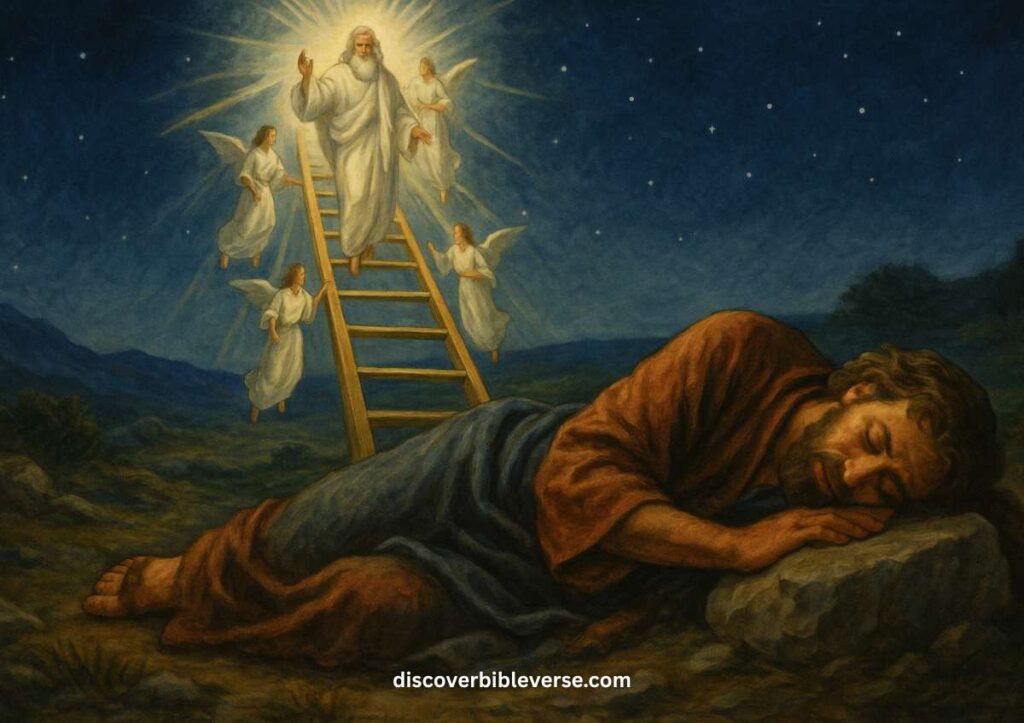
After deceiving his father Isaac and taking his brother Esau’s blessing, Jacob was forced to flee for his life. Esau burned with anger, and Rebekah, their mother, urged Jacob to escape to her brother Laban’s house in Haran.
So Jacob set out alone on a long journey into the unknown. He traveled through rugged terrain, likely filled with guilt, fear, and uncertainty. One night, as the sun set and the sky turned dark, he stopped to rest. With a stone for a pillow, he lay down to sleep under the open sky.
That night, Jacob had a dream—a divine encounter that would change his life forever.
He saw a stairway (or ladder) reaching from the earth up to heaven, and on it, angels were ascending and descending. At the top stood the Lord, who spoke to Jacob and reaffirmed the covenant He had made with Abraham and Isaac:
“I am the Lord, the God of your father Abraham and the God of Isaac. I will give you and your descendants the land on which you are lying. Your descendants will be like the dust of the earth… and all peoples on earth will be blessed through you and your offspring. I am with you and will watch over you wherever you go.”
Jacob woke up in awe.
“Surely the Lord is in this place, and I was not aware of it,” he said. Filled with reverence, he added,
“How awesome is this place! This is none other than the house of God; this is the gate of heaven.”
He took the stone he had used as a pillow and set it up as a pillar, pouring oil on it to consecrate it. He named the place Bethel, meaning “House of God.”
Jacob made a vow: if God would protect him on his journey and bring him back safely, then the Lord would be his God. He even promised to give God a tenth of all he received.
This story marks a turning point in Jacob’s life. Though he had just come from deception and strife, God met him with grace. Jacob didn’t find God in a temple or a perfect moment—he found Him in the wilderness, while running from his mistakes.
The vision of the ladder reminds us that heaven is not far off. There’s a connection between the divine and the earthly, between God’s realm and ours. And Jesus would later say, in John 1:51, that He is the true ladder—the way to the Father, the bridge between heaven and earth.
The post Jacob’s Ladder: A Dream of Heaven (Genesis 28:10–22) appeared first on Discover Bible Verse.
]]>The post Jacob and Esau: A Tale of Twins and Birthrights (Genesis 25:19–34; 27) appeared first on Discover Bible Verse.
]]>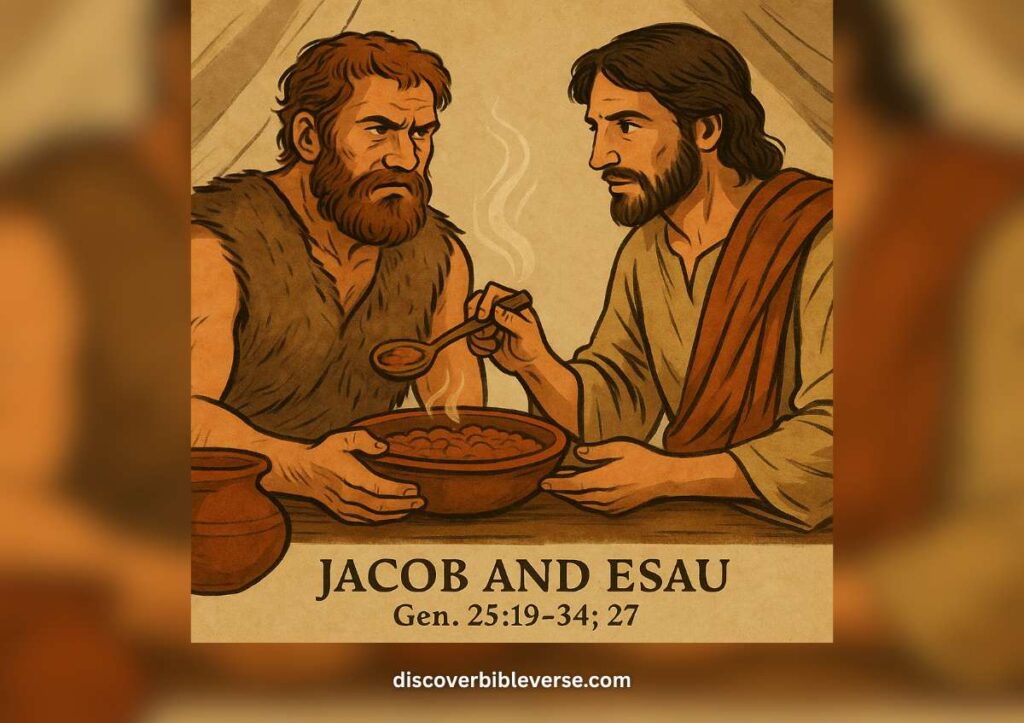
Isaac, the promised son of Abraham, married Rebekah, and after many years of prayer, God blessed them with twin sons—Esau and Jacob. Even before their birth, they struggled within Rebekah’s womb. The Lord told her,
“Two nations are in your womb… and the older will serve the younger.”
Esau was born first, red and hairy, and Jacob followed, grasping Esau’s heel—a sign of the rivalry that would mark their lives. Esau grew into a rugged hunter, favored by Isaac. Jacob, quieter and more thoughtful, stayed near the tents and was loved by Rebekah.
One day, Esau returned from the fields, exhausted and hungry. He found Jacob cooking a pot of stew and begged for some. Seizing the moment, Jacob said:
“First, sell me your birthright.”
The birthright was a sacred privilege—it meant leadership, inheritance, and spiritual blessing.
Driven by his appetite, Esau replied,
“What good is the birthright to me if I die of hunger?”
He swore an oath and sold his birthright for a bowl of lentil stew.
In that moment, Esau despised what was sacred for what was temporary.
Years later, when Isaac was old and nearly blind, he called for Esau and asked him to hunt game and prepare a meal so he could bless him before he died. But Rebekah overheard and devised a plan. She wanted Jacob, the chosen one, to receive the blessing.
Jacob hesitated, fearing his father would recognize him. But Rebekah covered his arms with goat skin and dressed him in Esau’s clothes. Jacob approached Isaac, pretending to be his brother. Suspicious but convinced, Isaac gave Jacob the blessing meant for the firstborn—a blessing of abundance, leadership, and divine favor.
Soon after, Esau returned. When the truth came out, he was devastated.
“Bless me—me too, my father!” he cried. But Isaac could not undo what had been done. Esau held a grudge and vowed to kill Jacob, forcing him to flee.
Jacob’s journey from there would be long and transformative, but God’s hand was always on him.
This story is rich with lessons: the danger of impulsive choices, the consequences of deception, and the sovereignty of God, who works through even broken people to fulfill His promises. Jacob, though flawed, would become Israel—the father of twelve tribes. And through his line would come Jesus, the Savior of the world.
The post Jacob and Esau: A Tale of Twins and Birthrights (Genesis 25:19–34; 27) appeared first on Discover Bible Verse.
]]>The post Abraham and Isaac on Mount Moriah (Genesis 22:1–19) appeared first on Discover Bible Verse.
]]>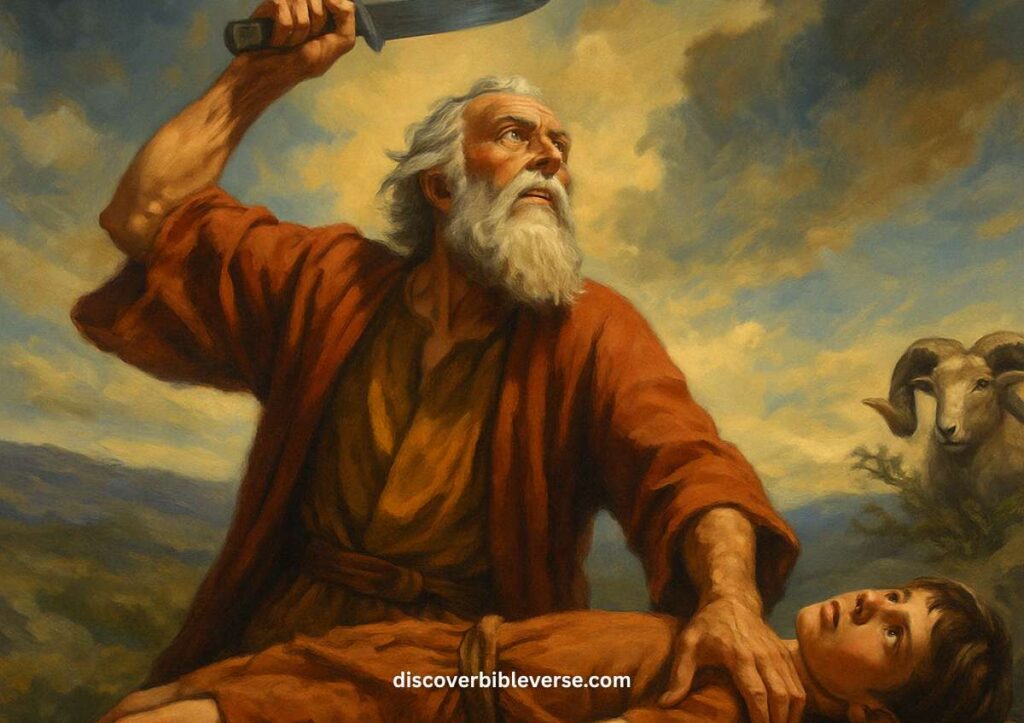
After years of waiting and trusting in God’s promise, Abraham and Sarah were finally blessed with a son—Isaac, the child of promise. He was the answer to their prayers, the hope of a future nation, and the living reminder that nothing is impossible with God.
But then came a test that would stretch Abraham’s faith to its absolute limit.
One day, God spoke to Abraham:
“Take your son, your only son, whom you love—Isaac—and go to the region of Moriah. Sacrifice him there as a burnt offering on a mountain I will show you.”
The command was almost unthinkable. Isaac wasn’t just any child—he was the miracle, the heir, the one through whom God had said, “Your descendants will be as numerous as the stars.” And yet, Abraham obeyed. Early the next morning, he saddled his donkey, took two servants, and brought Isaac along with wood for the offering.
After three days of travel, Abraham saw the place from a distance. He told his servants to stay behind, saying something remarkable:
“Stay here… we will worship and then we will come back to you.”
Abraham believed—somehow—that God would still keep His promise.
As father and son climbed the mountain together, Isaac carried the wood. He asked,
“Father… the fire and wood are here, but where is the lamb for the burnt offering?”
Abraham replied with words that echoed through history:
“God Himself will provide the lamb.”
When they reached the place, Abraham built the altar, arranged the wood, bound his son Isaac, and laid him on top. He raised the knife, ready to obey the unthinkable.
But at that moment, the angel of the Lord called out:
“Abraham! Abraham! Do not lay a hand on the boy.”
God had seen Abraham’s heart—his trust, his obedience, his fear of the Lord.
Then Abraham looked up—and there in a thicket was a ram caught by its horns. God had indeed provided a sacrifice. Abraham offered the ram instead of his son, and he named the place Yahweh-Yireh—“The Lord Will Provide.”
God reaffirmed His covenant, saying:
“Because you have not withheld your son, your only son, I will surely bless you… and through your offspring all nations on earth will be blessed.”
This story foreshadows another Father who would offer His only Son—but this time, there would be no substitute. Jesus, the Lamb of God, would give His life for the sins of the world. Abraham and Isaac’s story points us to Calvary, where God’s love and provision were fully revealed.
The post Abraham and Isaac on Mount Moriah (Genesis 22:1–19) appeared first on Discover Bible Verse.
]]>The post The Destruction of Sodom and Gomorrah (Genesis 18–19) appeared first on Discover Bible Verse.
]]>
As Abraham settled in the land God had promised, his nephew Lot lived in the city of Sodom—a place infamous for its wickedness. Along with Gomorrah, these cities had become so corrupt that their sin rose as a stench before heaven.
One day, God visited Abraham through three divine messengers, one of whom was the Lord Himself. As Abraham welcomed them with honor and hospitality, they shared an important message: Sarah, though barren and old, would soon bear a son. Then, God revealed something even more urgent—He was about to judge Sodom and Gomorrah.
Abraham, knowing that Lot lived there, pleaded with God in one of the most heartfelt prayers in Scripture.
“Will You sweep away the righteous with the wicked?”
He asked if God would spare the city for the sake of fifty righteous people, then forty-five, then forty… all the way down to ten. And God agreed: if ten righteous were found, He would not destroy it.
But ten could not be found.
Two angels went to Sodom and found Lot at the city gate. Lot invited them into his home, offering shelter. But as night fell, the men of Sodom surrounded the house, demanding the visitors be brought out to them. It was a moment that confirmed the depth of the city’s depravity.
The angels struck the mob with blindness and told Lot: “Get your family and flee. The Lord is about to destroy this place.”
At dawn, the angels urged Lot, his wife, and two daughters to hurry. They hesitated, so the angels grabbed them by the hands and led them out of the city.
As they fled, the angels gave a command:
“Do not look back. Do not stop anywhere in the plain. Flee to the mountains or you will be swept away.”
Then came the judgment.
Fire and sulfur rained from heaven, consuming Sodom, Gomorrah, and everything in the valley. The cities were reduced to ash, a devastating reminder of God’s justice.
Lot’s wife, however, disobeyed. She looked back, longing for the life she left behind—and in that moment, she was turned into a pillar of salt.
The next morning, Abraham looked out across the land and saw smoke rising like a furnace. The cities were gone. But God remembered Abraham, and because of his intercession, Lot was spared.
The story of Sodom and Gomorrah is a sobering one. It shows the seriousness of sin, the certainty of divine justice, and the mercy of a God who listens to intercession. It also reminds us: when God tells us to leave something behind, we must not look back.
The post The Destruction of Sodom and Gomorrah (Genesis 18–19) appeared first on Discover Bible Verse.
]]>The post The Call of Abraham (Genesis 12:1–9) appeared first on Discover Bible Verse.
]]>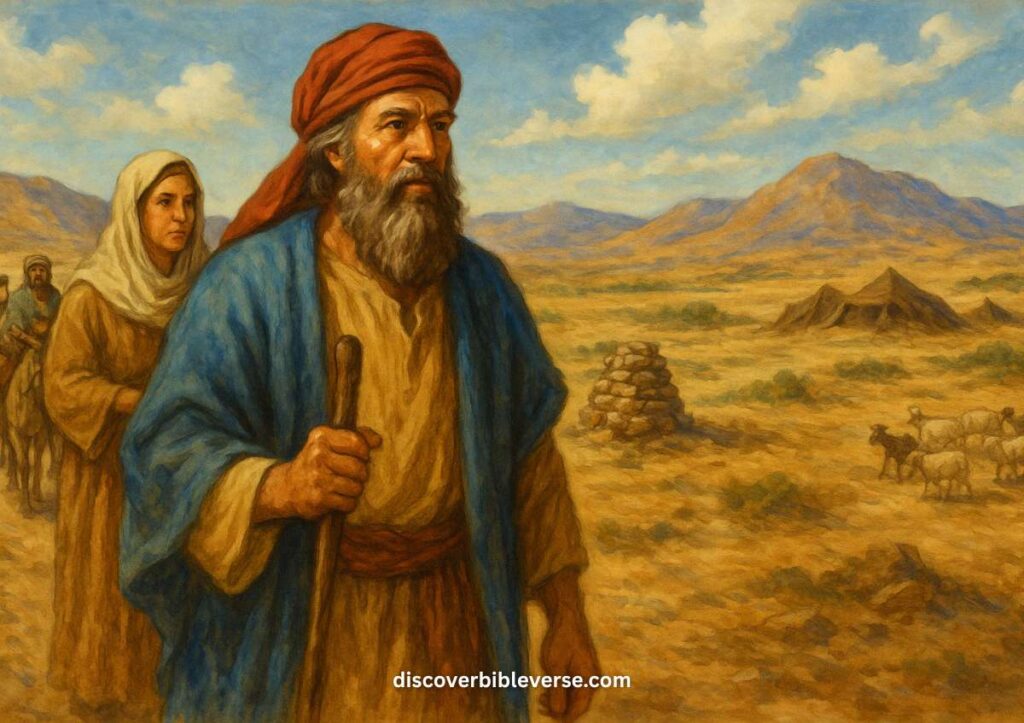
In a world of many gods and fading faith, one man stood at the crossroads of history—Abram, later known as Abraham. He lived in Ur of the Chaldeans, a prosperous city with its own customs, gods, and comforts. But Abram’s story would begin not with what he built, but with what he left behind.
One day, the voice of the one true God came to him with a divine call:
“Go from your country, your people, and your father’s household to the land I will show you.”
It was a call that demanded faith—a journey into the unknown.
God followed that command with a breathtaking promise:
“I will make you into a great nation, and I will bless you. I will make your name great, and you will be a blessing. I will bless those who bless you, and whoever curses you I will curse. And all peoples on earth will be blessed through you.”
Abram was 75 years old. He could have said no. He could have clung to what was familiar. But instead, he obeyed. He gathered his wife Sarai, his nephew Lot, and all their possessions, and set out for the land of Canaan—a place he had never seen but believed in because God had spoken.
When Abram arrived in Canaan, the Lord appeared to him again and said,
“To your offspring I will give this land.”
In response, Abram built an altar to the Lord, right there in the land of promise. Then he continued to travel, pitching his tent between Bethel and Ai, and again building an altar and calling on the name of the Lord.
This wasn’t just a journey across a map—it was the beginning of a covenant, a sacred partnership between God and a man who chose to walk by faith, not by sight. Abram didn’t know where he was going, but he knew the One who was leading.
The call of Abraham reminds us that God often invites us into the unknown so He can reveal His promises. Faith is not about having all the answers—it’s about trusting the One who does.
The post The Call of Abraham (Genesis 12:1–9) appeared first on Discover Bible Verse.
]]>The post The Tower of Babel (Genesis 11:1–9) appeared first on Discover Bible Verse.
]]>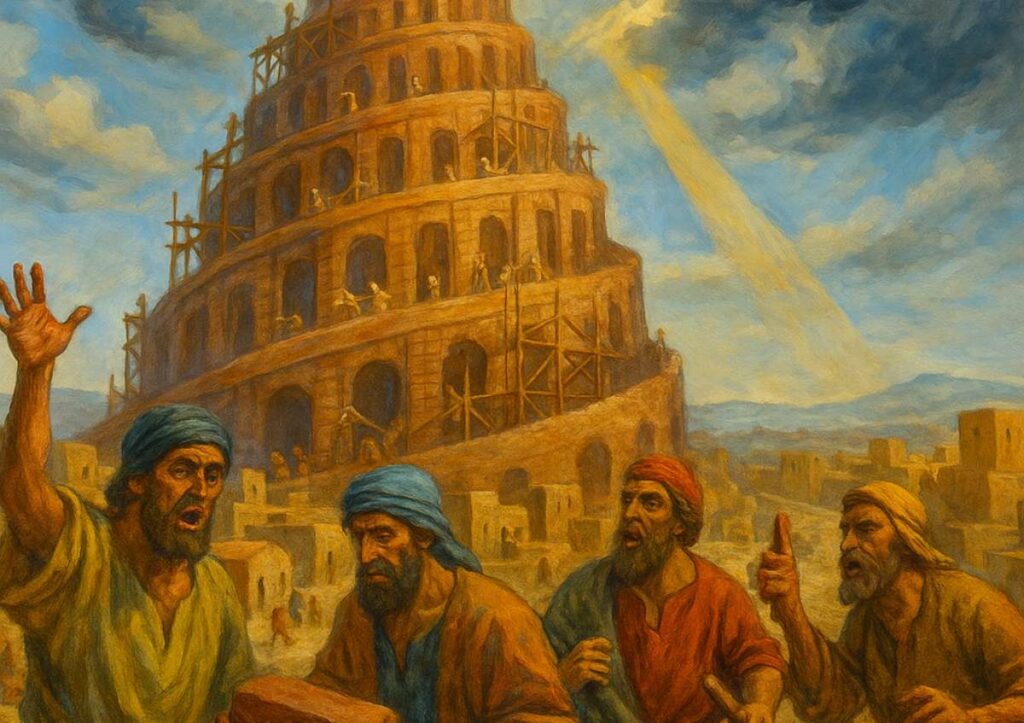
After the great flood, Noah’s descendants began to multiply and spread across the earth. Yet instead of filling the whole world as God had commanded, they settled together in a region called Shinar. With one language and one speech, humanity was united—but their hearts began to drift from the will of God.
The people said to one another, “Come, let us make bricks and bake them thoroughly.” With bricks instead of stone and tar for mortar, they had the tools to build. Then came their bold declaration:
“Come, let us build ourselves a city, with a tower that reaches to the heavens, so that we may make a name for ourselves and not be scattered over the face of the whole earth.”
This wasn’t just about architecture—it was rebellion. It was pride. They weren’t trying to honor God; they were trying to elevate themselves. They wanted to stay in one place, create their own legacy, and challenge the very limits of heaven.
But God came down to see the city and the tower the people were building. The Creator, who once looked upon His creation and called it “very good,” now saw ambition twisted by arrogance. God said:
“If as one people speaking the same language they have begun to do this, then nothing they plan to do will be impossible for them.”
So God acted. In an instant, He confused their language, causing the people to no longer understand each other. Chaos broke out. Cooperation turned into frustration. The building stopped. The city was abandoned. And the people were scattered across the face of the earth—just as God originally intended.
The place was called Babel, because there the Lord confused the language of the whole world.
The story of the Tower of Babel is a powerful reminder that pride leads to downfall, and that unity without humility can become dangerous. God desires that we glorify His name, not our own. And He will lovingly disrupt our plans if they lead us away from Him.
This account also shows that God is still in control. Even when nations rise, languages shift, and people scatter, His purpose for humanity never fails. He is the God who brings order from confusion—and one day, through Christ, would gather the nations again.
The post The Tower of Babel (Genesis 11:1–9) appeared first on Discover Bible Verse.
]]>The post Noah’s Ark and the Great Flood (Genesis 6–9) appeared first on Discover Bible Verse.
]]>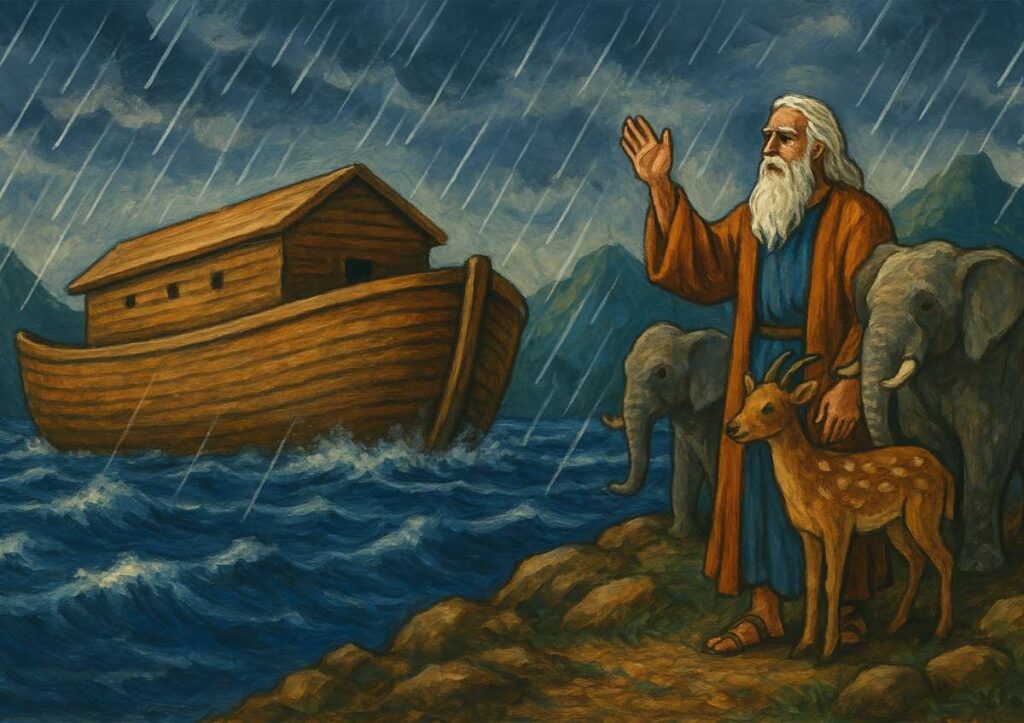
As generations passed after Adam and Eve, the world became increasingly corrupt. Humanity had turned its heart toward evil, violence filled the earth, and people lived with no regard for God. The Creator, heartbroken over the wickedness of mankind, decided to cleanse the earth with a great flood—but not without a plan of mercy.
Among the darkness, one man stood out—Noah. He was righteous, blameless among his generation, and walked faithfully with God. So the Lord gave Noah an extraordinary assignment: to build a massive ark, a vessel of salvation for his family and for pairs of every living creature on earth.
The ark was to be 300 cubits long, 50 cubits wide, and 30 cubits high—an enormous wooden structure with rooms and a roof, coated with pitch inside and out to make it waterproof. Though the world around him mocked or ignored him, Noah obeyed. He gathered food, supplies, and animals, just as God commanded.
When everything was ready, God invited Noah, his wife, his three sons—Shem, Ham, and Japheth—and their wives into the ark. Along with them came two of every kind of animal, bird, and creeping thing. Then the Lord Himself shut the door.
The rains came. For forty days and forty nights, water fell from the sky, and the fountains of the deep burst open. The entire earth was flooded. Every mountain was covered. Every living thing outside the ark perished.
But Noah, his family, and the animals were safe inside the ark. They floated on the waters, sustained by God’s hand.
After 150 days, the waters began to recede. The ark came to rest on the mountains of Ararat. Noah waited patiently, sending out a raven, then a dove. When the dove returned with an olive leaf, it was a sign of new life. Eventually, the land was dry, and God told Noah to come out of the ark.
Noah’s first act was worship. He built an altar and offered sacrifices of gratitude to God. The Lord was pleased and made a covenant—a sacred promise—with Noah and all creation. Never again would He destroy the earth with a flood.
As a sign of His promise, God placed a rainbow in the sky. Every time the rainbow appears, it reminds us of God’s mercy, faithfulness, and the new beginning He gave humanity.
Noah’s story is one of obedience, judgment, salvation, and covenant. It teaches us that even in the midst of widespread corruption, one person’s faith can make a difference. And it reminds us that no matter how high the waters rise, God always makes a way for redemption.
The post Noah’s Ark and the Great Flood (Genesis 6–9) appeared first on Discover Bible Verse.
]]>The post Cain and Abel (Genesis 4) appeared first on Discover Bible Verse.
]]>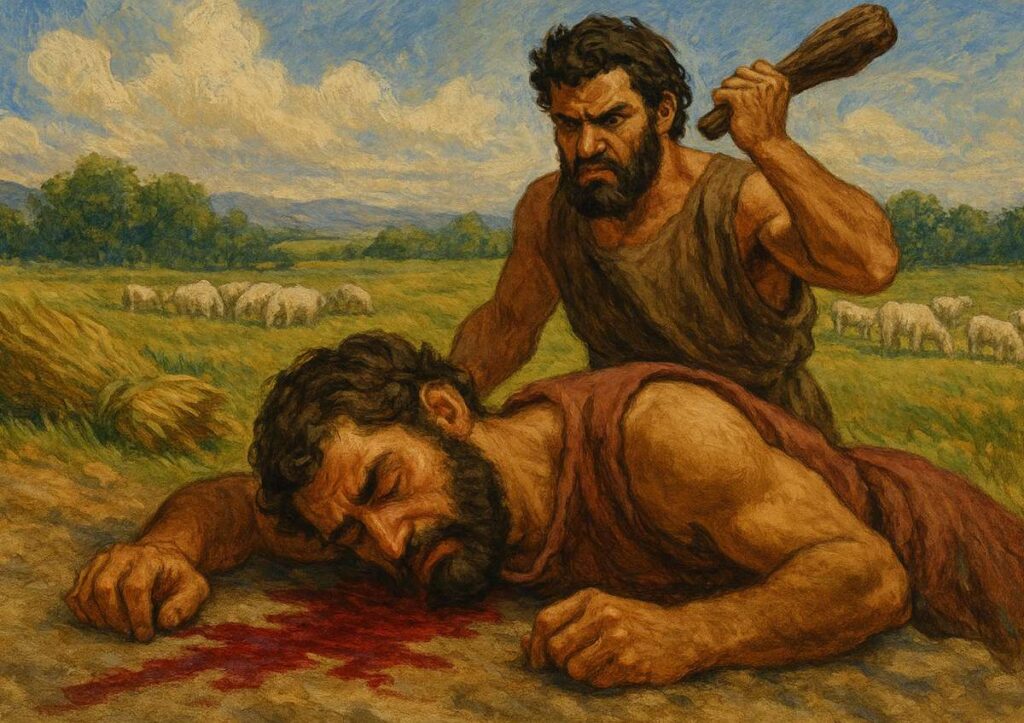
After being banished from Eden, Adam and Eve began a new chapter outside paradise. In time, Eve gave birth to two sons. The first was Cain, a farmer who worked the soil. The second was Abel, a shepherd who tended flocks.
Both brothers brought offerings to the Lord. Cain brought some of the fruits of the ground, while Abel brought fat portions from the firstborn of his flock. God looked with favor on Abel and his offering, but He did not accept Cain’s. The Bible doesn’t give all the details, but it’s clear that Abel’s offering came from a heart of faith and reverence, while Cain’s lacked the same spirit.
Cain became furious. His face darkened with jealousy and rejection. But God, seeing his heart, reached out to him in grace. “Why are you angry?” God asked. “If you do what is right, will you not be accepted? But if you do not do what is right, sin is crouching at your door; it desires to have you, but you must rule over it.”
Instead of repenting, Cain gave in to the anger that consumed him.
One day, while in the field, Cain lured his brother out—and murdered him. The first act of violence in human history wasn’t between enemies. It was between brothers.
God came to Cain with a question, one that echoes through time: “Where is your brother Abel?”
Cain replied with a lie and a cold-hearted question of his own: “I don’t know. Am I my brother’s keeper?”
But God knew what had happened. “Your brother’s blood cries out to me from the ground,” He said. As a result of his crime, Cain was cursed. The ground would no longer yield its strength to him, and he would become a restless wanderer on the earth.
Even then, God’s mercy showed up. Cain feared he would be killed, but the Lord placed a mark on him—an act of protection that said: no one may take vengeance on Cain.
Adam and Eve later had another son, Seth, and through his line, people once again began to call on the name of the Lord.
This story reminds us that unchecked jealousy can lead to destruction—but God is always near, offering grace and warning us when sin crouches at our door. The story of Cain and Abel asks us: How is your heart before God? And how do you treat your brother?
The post Cain and Abel (Genesis 4) appeared first on Discover Bible Verse.
]]>The post Adam and Eve in the Garden of Eden (Genesis 2–3) appeared first on Discover Bible Verse.
]]>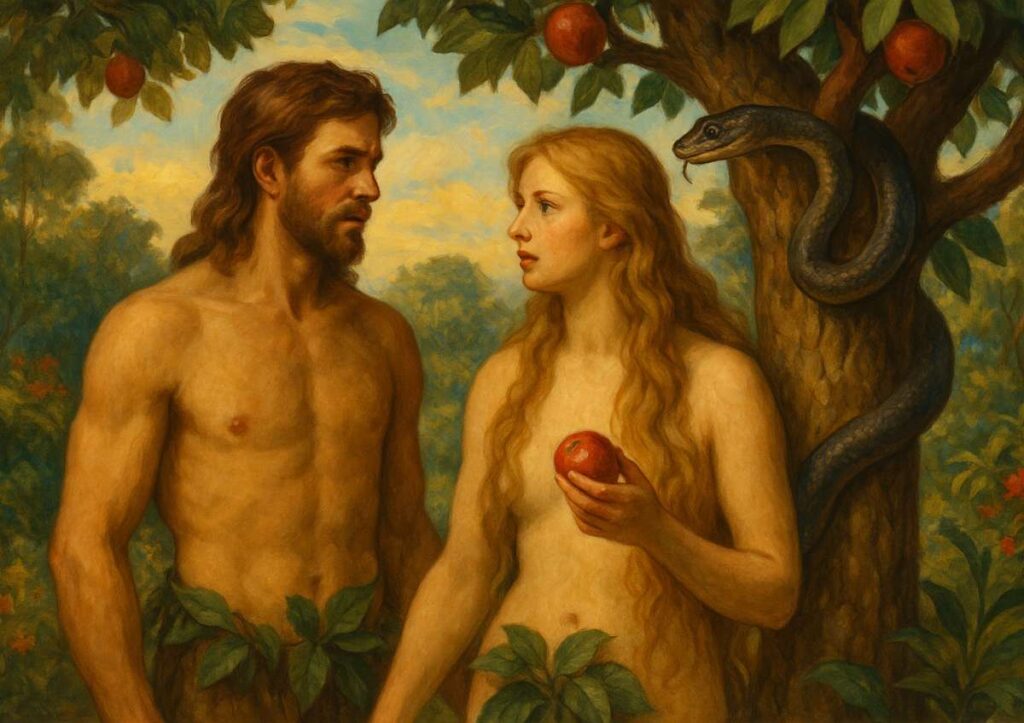
After creating the heavens, the earth, and every living thing, God placed the first man, Adam, in a beautiful garden called Eden. This garden was paradise—lush, vibrant, and filled with everything good. Rivers flowed through it, trees bore delicious fruit, and animals roamed peacefully. In the center of the garden stood two significant trees: the Tree of Life and the Tree of the Knowledge of Good and Evil.
God gave Adam purpose. He was to work the garden and take care of it. But there was also one command: “You may eat from any tree in the garden, but you must not eat from the Tree of the Knowledge of Good and Evil. For when you eat from it, you will certainly die.”
God saw that it wasn’t good for Adam to be alone. So He caused Adam to fall into a deep sleep, took one of his ribs, and formed a woman—Eve. She became his companion, and together they reflected the image and unity of their Creator.
Adam and Eve lived in complete harmony with God, each other, and all of creation. They walked with God in the garden. There was no shame, no fear, and no sin. They were naked and unashamed, fully known and fully loved.
But a serpent appeared—crafty and deceitful. It questioned Eve, twisting God’s words: “Did God really say you must not eat from any tree in the garden?” Eve responded truthfully, but the serpent tempted her further. “You will not surely die,” it hissed. “God knows that when you eat it, your eyes will be opened, and you will be like God, knowing good and evil.”
Eve looked at the tree. The fruit was pleasing to the eye and desirable for gaining wisdom. She took it. She ate it. Then she gave some to Adam, who was with her, and he ate too.
At that moment, their eyes were opened. Shame entered their hearts. They realized they were naked and tried to cover themselves with fig leaves. Guilt, fear, and distance now stood between them and God.
When God came walking in the garden, they hid. God called out, “Where are you?” It wasn’t a question of location—it was a call of love. But sin had changed everything. Adam blamed Eve. Eve blamed the serpent.
God, in His justice, pronounced judgment: the serpent would crawl on its belly and face ultimate defeat; Eve would bear pain in childbirth and struggle in relationships; Adam would toil the ground in hardship. Then, with heavy hearts, God removed them from Eden.
But even in judgment, there was mercy. God made garments for Adam and Eve—covering them, pointing forward to a future covering of sin. And in the curse to the serpent, there was a promise: a descendant of the woman would one day crush the serpent’s head.
This story reminds us that sin breaks our connection with God, but His love pursues us even in our failure. Though humanity fell, God’s plan for redemption had only just begun.
The post Adam and Eve in the Garden of Eden (Genesis 2–3) appeared first on Discover Bible Verse.
]]>